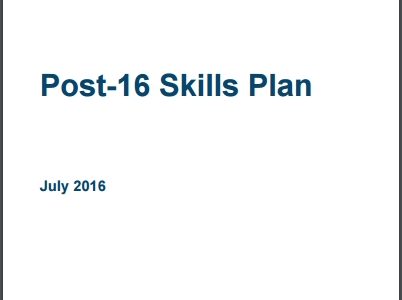The Fourth Industrial Revolution will demand a more long-term, whole career view of future digital skills needs.
The SkillsPlanner project aims to create an open linked data platform connecting those needing people with relevant construction skills (demand) with those able to educate and train people to gain those skills (supply). With the UK construction skills gap currently a subject of almost daily debate, it is little wonder the Government Construction Strategy 2016-2020 devoted a large section to meeting near-term needs (see Government recognises skills planning needs), and we read almost daily reports about new initiatives to train new workers and retain existing ones.
However, given that many of today’s teenagers have a working life of 50 or more years ahead of them, they – alongside existing workers – will need to be constantly updating their knowledge and digital skills throughout their careers, or planning for future career changes.
The Fourth Industrial Revolution
Evidence certainly suggests they cannot rely on their employers equipping them with the right expertise. In November 2015, for example, a study published by Vodafone and YouGov (news release) showed that, while businesses were aware of the need to keep pace with technological developments (in particular, digital technologies), around half doubted they would be able to keep up over the next five years – let alone five decades.
We only need to look back over the past 30 years to see how technology has transformed just about every aspect of our daily lives. Many of today’s business leaders in their 50s started their careers before email, before the worldwide web, before mobile telephones. Digital technologies have already transformed how we interact and work – and the pace of change shows no signs of slowing down.
Indeed, the World Economic Forum says we stand on the brink of a technological sea change – the Fourth Industrial Revolution – that will fundamentally alter the way we live, work, and relate to one another. WEF founder and executive chairman Klaus Schwab describes this latest Revolution:
 “The possibilities of billions of people connected by mobile devices, with unprecedented processing power, storage capacity, and access to knowledge, are unlimited. And these possibilities will be multiplied by emerging technology breakthroughs in fields such as artificial intelligence, robotics, the Internet of Things, autonomous vehicles, 3-D printing, nanotechnology, biotechnology, materials science, energy storage, and quantum computing.
“The possibilities of billions of people connected by mobile devices, with unprecedented processing power, storage capacity, and access to knowledge, are unlimited. And these possibilities will be multiplied by emerging technology breakthroughs in fields such as artificial intelligence, robotics, the Internet of Things, autonomous vehicles, 3-D printing, nanotechnology, biotechnology, materials science, energy storage, and quantum computing.
“Already, artificial intelligence is all around us, from self-driving cars and drones to virtual assistants and software that translate or invest. Impressive progress has been made in AI in recent years, driven by exponential increases in computing power and by the availability of vast amounts of data…. Digital fabrication technologies, meanwhile, are interacting with the biological world on a daily basis. Engineers, designers, and architects are combining computational design, additive manufacturing, materials engineering, and synthetic biology to pioneer a symbiosis between microorganisms, our bodies, the products we consume, and even the buildings we inhabit.”
Future built environment
Shwab says our response to this Fourth Industrial Revolution must be integrated and comprehensive, and involve all stakeholders. Yet, according to some critics, UK construction policy-makers seem focused on meeting immediate or short-term skills and physical infrastructure needs, and applying a narrow view of current technologies.
In Workplace Insight, for example, Mark Eltringham says “the Government seems to be largely unaware of or uninterested in what is happening beyond its bubble,” noting the Government Construction Strategy 2016-2020 “uses the word technology three times and, even then, only with regard to the application of BIM [building information modelling] as a way of improving the construction process.” He continues:
“Perhaps more worryingly, the very short section at the end of the document on whole life approaches only deals with the issue of sustainability. It makes no mention of creating the physical infrastructure capable of dealing with a rapidly changing world. [And] … the Government’s commitment to invest in technological infrastructure is woefully inadequate compared to its focus on physical infrastructure.”
Future skills
 What also seems to be lacking is a more wide-ranging and longer-term debate about future digital skills. One exception is SkillsPlanner collaborator BIM2050 which – as its name suggests – dares to look decades ahead; in 2014 it produced a report: Built Environment 2050: A Report on our Digital Future (available here, PDF) which, alongside some wider views of other trends, made some predictions about future skills needs:
What also seems to be lacking is a more wide-ranging and longer-term debate about future digital skills. One exception is SkillsPlanner collaborator BIM2050 which – as its name suggests – dares to look decades ahead; in 2014 it produced a report: Built Environment 2050: A Report on our Digital Future (available here, PDF) which, alongside some wider views of other trends, made some predictions about future skills needs:
- In the 2020s: “construction roles will be diluted/hybrid versions of their previously heavily-siloed forms. There will be a significant focus on up-skilling the existing workforce. … Computational and analytical skills will emerge as a valued area.”
- In the 2030s: “Skills within the industry will focus on the flow and process of information procurement and transactions throughout the supply chain. Sought after skills … will surround analytics and the ability to understand ‘big data’, [and] predictive data analysis.”
- In the 2040s: “the skilled workforce will be reduced to 50% of its level in 2013. … Skills and roles will become more focused on the operation, maintenance and redevelopment of existing assets rather than the building of new assets. … Automated assembly and digital manufacturing will see a need for further support in designing digital systems which will allow for the creation of smarter material that ultimately responds to its environment.”
Ethos, SkillsPlanner and Future Cities
As we enter the Fourth Industrial Revolution, we will increasingly – as Schwab said – need a comprehensive, integrated and inclusive response embracing all stakeholders, with silos broken down and connections made between public policy-making, infrastructure planning, and investment in education and technology.
 Future-gazing is all very well, but it also needs to be matched by a willingness to test new ways of living, working and interacting in our built environment. This fits with the vision of Ethos, and in particular its recent establishment of a business sector focused on Future Cities, in parallel with Ethos Skills. Future Cities currently has three product lines – focused on Parking, Retail and Active Mobility – all focused on particular human interactions with their surroundings, and deploying technology and using real-time data to help people and organisations better manage transportation and other aspects of their built environment.
Future-gazing is all very well, but it also needs to be matched by a willingness to test new ways of living, working and interacting in our built environment. This fits with the vision of Ethos, and in particular its recent establishment of a business sector focused on Future Cities, in parallel with Ethos Skills. Future Cities currently has three product lines – focused on Parking, Retail and Active Mobility – all focused on particular human interactions with their surroundings, and deploying technology and using real-time data to help people and organisations better manage transportation and other aspects of their built environment.
Like our friends at BIM2050, we are excited about the prospects of creating new combinations of people, processes and technologies. We believe tomorrow’s leaders – some of them, perhaps, just about to start their careers – in the industry currently known as construction will be the ones that anticipate best and respond quickest to the multi-faceted challenges of delivering an increasingly digital built environment in the mid 21st century.





 “The possibilities of billions of people connected by mobile devices, with unprecedented processing power, storage capacity, and access to knowledge, are unlimited. And these possibilities will be multiplied by emerging technology breakthroughs in fields such as artificial intelligence, robotics, the Internet of Things, autonomous vehicles, 3-D printing, nanotechnology, biotechnology, materials science, energy storage, and quantum computing.
“The possibilities of billions of people connected by mobile devices, with unprecedented processing power, storage capacity, and access to knowledge, are unlimited. And these possibilities will be multiplied by emerging technology breakthroughs in fields such as artificial intelligence, robotics, the Internet of Things, autonomous vehicles, 3-D printing, nanotechnology, biotechnology, materials science, energy storage, and quantum computing. What also seems to be lacking is a more wide-ranging and longer-term debate about future digital skills. One exception is SkillsPlanner collaborator
What also seems to be lacking is a more wide-ranging and longer-term debate about future digital skills. One exception is SkillsPlanner collaborator 

